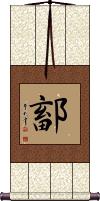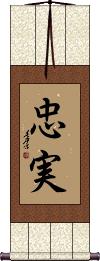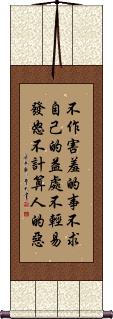Many custom options...
And formats...

Chu Do in Chinese / Japanese...
Buy a Chu Do calligraphy wall scroll here!
Personalize your custom “Chu Do” project by clicking the button next to your favorite “Chu Do” title below...
Chu
Surname
This is a Chinese surname that romanizes as Chu.
Please note, there are several surnames that romanize as Chu. In fact, in the mainland, names that romanize as Zhu would be Chu in Taiwan. It's easy to get confused to please email me if you are not sure about which surname you need (send me an image of the character if you can).
Loyalty / Faithful / Devoted
忠実 is a Japanese way to write “Loyalty” - it also contains the ideas of being faithful, devoted, true, and obedient.
The second character is a modified form only used in the Japanese lexicon; however, Chinese speakers can easily guess the meaning.
This is also a virtue of the Samurai Warrior
See our page with just Code of the Samurai / Bushido here
Better Late Than Never
It's Never Too Late Too Mend
Long ago in what is now China, there were many kingdoms throughout the land. This time period is known as “The Warring States Period” by historians because these kingdoms often did not get along with each other.
Sometime around 279 B.C. the Kingdom of Chu was a large but not particularly powerful kingdom. Part of the reason it lacked power was the fact that the King was surrounded by “yes men” who told him only what he wanted to hear. Many of the King's court officials were corrupt and incompetent which did not help the situation.
The King was not blameless himself, as he started spending much of his time being entertained by his many concubines.
One of the King's ministers, Zhuang Xin, saw problems on the horizon for the Kingdom, and warned the King, “Your Majesty, you are surrounded by people who tell you what you want to hear. They tell you things to make you happy and cause you to ignore important state affairs. If this is allowed to continue, the Kingdom of Chu will surely perish, and fall into ruins.”
This enraged the King who scolded Zhuang Xin for insulting the country and accused him of trying to create resentment among the people. Zhuang Xin explained, “I dare not curse the Kingdom of Chu but I feel that we face great danger in the future because of the current situation.” The King was simply not impressed with Zhuang Xin's words.
Seeing the King's displeasure with him and the King's fondness for his court of corrupt officials, Zhuang Xin asked permission from the King that he may take leave of the Kingdom of Chu, and travel to the State of Zhao to live. The King agreed, and Zhuang Xin left the Kingdom of Chu, perhaps forever.
Five months later, troops from the neighboring Kingdom of Qin invaded Chu, taking a huge tract of land. The King of Chu went into exile, and it appeared that soon, the Kingdom of Chu would no longer exist.
The King of Chu remembered the words of Zhuang Xin and sent some of his men to find him. Immediately, Zhuang Xin returned to meet the King. The first question asked by the King was “What can I do now?”
Zhuang Xin told the King this story:
A shepherd woke one morning to find a sheep missing. Looking at the pen saw a hole in the fence where a wolf had come through to steal one of his sheep. His friends told him that he had best fix the hole at once. But the Shepherd thought since the sheep is already gone, there is no use fixing the hole.
The next morning, another sheep was missing. And the Shepherd realized that he must mend the fence at once. Zhuang Xin then went on to make suggestions about what could be done to reclaim the land lost to the Kingdom of Qin, and reclaim the former glory and integrity of the Kingdom of Chu.
The Chinese idiom shown above came from this reply from Zhuang Xin to the King of Chu almost 2,300 years ago.
It translates roughly into English as...
“Even if you have lost some sheep, it's never too late to mend the fence.”
This proverb, 亡羊补牢犹未为晚, is often used in modern China when suggesting in a hopeful way that someone change their ways, or fix something in their life. It might be used to suggest fixing a marriage, quitting smoking, or getting back on track after taking an unfortunate path in life among other things one might fix in their life.
I suppose in the same way that we might say, “Today is the first day of the rest of your life” in our western cultures to suggest that you can always start anew.
Note: This does have Korean pronunciation but is not a well-known proverb in Korean (only Koreans familiar with ancient Chinese history would know it). Best if your audience is Chinese.
Drain the pond to get all the fish
Kill the goose that lays the golden eggs
In 632 BC, Duke Wen of the Kingdom of Jin was about to lead an army against the forces of the Kingdom of Chu.
The Duke asked one of his advisers, Jiu Fan, how they could win the impending battle, as they were drastically outnumbered.
Jiu Fan said, “All is fair in war,” and suggested a plan of dishonorable tactics (cheating).
The Duke was unsure of this advice, so he asked another adviser, Yong Ji, who replied, “If you catch fish by draining the pond, you can certainly get all the fish. But there will be no fish the following year. You can cheat this one time in battle, but such tactics can only be used once, as the enemy will be wise in future encounters.”
The Duke heard the words of his wiser adviser but cheated to gain victory in the battle. However, he rewarded Yong Ji more than Jiu Fan at the victory celebration, stating that while Jiu Fan's advice gained one victory, the wise words of Yong Ji would last forever.
This Chinese idiom/proverb is still used, over 2600 years later to remind people not to burn bridges, cheat, or dishonor themselves in exchange for a short-term gain while sacrificing the future.
竭澤而漁 is very similar to the meaning of the English phrase, “Kill the goose that lays the golden eggs.”
1 Corinthians 13:5
Here is 1 Corinthians 13:5 in Chinese.
The text with punctuation:
不作害羞的事。不求自己的益处。不轻易发怒。不计算人的恶。
Hand-painted calligraphy does not retain punctuation.
This translation is from the Chinese Union Bible.
You may know it from the KJV as:
Doth not behave itself unseemly, seeketh not her own, is not easily provoked, thinketh no evil.
Not the results for Chu Do that you were looking for?
Below are some entries from our dictionary that may match your Chu Do search...
| Characters If shown, 2nd row is Simp. Chinese |
Pronunciation Romanization |
Simple Dictionary Definition |
宙 see styles |
zhòu zhou4 chou chuu / chu ちゅう |
More info & calligraphy: Universe / Space(1) space; air; midair; (2) (See 空・そら・5) (from) memory; (by) heart; (male given name) Hiroshi |
忠 see styles |
zhōng zhong1 chung chuu / chu ちゅう |
More info & calligraphy: Loyalty to Duty or Master(1) loyalty; devotion; fidelity; faithfulness; (2) (See 判官・はんがん・2,弾正台・2) inspector of the Imperial Prosecuting and Investigating Office (ritsuryō system); (given name) Makoto Loyal. |
鄐 see styles |
chù chu4 ch`u chu |
More info & calligraphy: Chu |
ちゅー see styles |
chuu / chu チュー |
(noun/participle) (1) (colloquialism) kiss; (n,adv-to) (2) squeak (as in the sound made by mice); (3) sound of liquid being sucked up; (place-name) Chu (Kyrgyzstan); (place-name) Chu (Kazakhstan) |
九 see styles |
jiǔ jiu3 chiu chuu / chu チュー |
nine; 9 (numeric) (クー, キュー or チュー in mahjong) nine (chi: jiǔ); (surname) Maru Navan; nava. Nine. |
厨 see styles |
chuu / chu ちゅう |
(n,n-suf) (abbreviation) (net-sl) (derogatory term) (See 厨房・2) (Internet) troll; nerd; freak; addict; fag; (given name) Chuu |
廚 厨 see styles |
chú chu2 ch`u chu chū くりや |
kitchen kitchen A kitchen; also a cabinet for an image. |
抽 see styles |
chōu chou1 ch`ou chou chū |
to draw out; to pull out from in between; to remove part of the whole; (of certain plants) to sprout or bud; to whip or thrash Draw, withdraw, pull out. |
拄 see styles |
zhǔ zhu3 chu chu |
to lean on; to prop on A prop, a post. |
晝 昼 see styles |
zhòu zhou4 chou chū ひる |
daytime (out-dated kanji) (n-adv,n-t) (1) noon; midday; (2) daytime; (3) lunch Day, daytime, daylight. |
楚 see styles |
chǔ chu3 ch`u chu chiyu ちゆ |
distinct; clear; orderly; pain; suffering; deciduous bush used in Chinese medicine (genus Vitex); punishment cane (old) (1) (archaism) switch (long, tender shoot of a plant); (2) switch (cane used for flogging); (archaism) switch (flogging implement made from a branch); (place-name) Chu (name of several ancient Chinese states); Ch'u Brambles, spinous; painful, grievous; to flog; clear up; the Chu state. |
注 see styles |
zhù zhu4 chu chuu / chu ちゅう |
to inject; to pour into; to concentrate; to pay attention; stake (gambling); classifier for sums of money; variant of 註|注[zhu4] (noun/participle) annotation; explanatory note; comment; (given name) Chuu Fix, record; flow. |
疇 畴 see styles |
chóu chou2 ch`ou chou chū |
arable fields; cultivated field; class; category one's group, companions, peers |
瘳 see styles |
chōu chou1 ch`ou chou chū |
to convalesce; to recover; to heal to be healed |
籌 筹 see styles |
chóu chou2 ch`ou chou chuu / chu ちゅう |
chip (in gambling); token (for counting); ticket; to prepare; to plan; to raise (funds); resource; way; means (archaism) wooden skewer used for counting; (given name) Hikaru To calculate, devise, plan; a tally. |
綢 绸 see styles |
chóu chou2 ch`ou chou chū |
(light) silk; CL:匹[pi3] fine |
肘 see styles |
zhǒu zhou3 chou chū ひじ |
elbow; pork shoulder elbow hasta, forearm, the 16,000th part of a yojana; it varies from 1ft. 4in. to 1ft. 8in. in length. |
胄 see styles |
zhòu zhou4 chou chū かぶと |
helmet; descendants (irregular kanji usage) helmet (of armor, armour); headpiece posterity |
芭 see styles |
bā ba1 pa hana はな |
an unidentified fragrant plant mentioned in the Songs of Chu 楚辭|楚辞[Chu3ci2]; used in 芭蕉[ba1jiao1]; used in transliteration (female given name) Hana |
荊 荆 see styles |
jīng jing1 ching kei / ke けい |
chaste tree or berry (Vitex agnus-castus); alternative name for the Zhou Dynasty state of Chu 楚國|楚国[Chu3 guo2] (1) thorny shrub; (2) wild rose; briar; (3) thorn; (4) (archit) cusp; (surname) Kei |
註 注 see styles |
zhù zhu4 chu chū ちゅう |
to register; to annotate; note; comment (noun/participle) annotation; explanatory note; comment Explain, open up the meaning, define. |
誅 诛 see styles |
zhū zhu1 chu chuu / chu ちゅう |
to put (a criminal) to death; to punish death penalty |
躄 see styles |
bì bi4 pi chū いざり |
both feet crippled; lame (1) crawling on the ground; shuffling one one's knees; (2) (sensitive word) cripple crippled |
郢 see styles |
yǐng ying3 ying |
Ying, ancient capital of Chu 楚 in Hubei, Jianling county 江陵縣|江陵县 |
酎 see styles |
zhòu zhou4 chou chuu / chu ちゅう |
strong wine (abbreviation) (See 焼酎) shōchū; (female given name) Chuu |
阰 see styles |
pí pi2 p`i pi |
mountain in ancient Chu |
駐 驻 see styles |
zhù zhu4 chu chuu / chu ちゅう |
to halt; to stay; to be stationed (of troops, diplomats etc) (abbreviation) (See 駐車場) parking; parking lot; parking space |
中周 see styles |
zhōng zhōu zhong1 zhou1 chung chou chū shū |
middle round |
中壇 中坛 see styles |
zhōng tán zhong1 tan2 chung t`an chung tan chū dan |
middle altar |
中現 中现 see styles |
zhōng xiàn zhong1 xian4 chung hsien chū gen |
here manifested |
Click here for more Chu Do results from our dictionary
The following table may be helpful for those studying Chinese or Japanese...
| Title | Characters | Romaji (Romanized Japanese) | Various forms of Romanized Chinese | |
| Chu | 鄐 | chù / chu4 / chu | ch`u / chu | |
| Loyalty Faithful Devoted | 忠實 忠実 | chuujitsu / chuugi chujitsu / chugi | ||
| Better Late Than Never | 亡羊補牢猶未為晚 亡羊补牢犹未为晚 | wáng yáng bǔ láo yóu wèi wéi wǎn wang2 yang2 bu3 lao2 you2 wei4 wei2 wan3 wang yang bu lao you wei wei wan | wang yang pu lao yu wei wei wan wangyangpulaoyuweiweiwan |
|
| Drain the pond to get all the fish | 竭澤而漁 竭泽而渔 | jié zé ér yú jie2 ze2 er2 yu2 jie ze er yu jiezeeryu | chieh tse erh yü chiehtseerhyü |
|
| 1 Corinthians 13:5 | 不作害羞的事不求自己的益處不輕易發怒不計算人的惡 不作害羞的事不求自己的益处不轻易发怒不计算人的恶 | bù zuò hài xiū de shì bù qiú zì jǐ de yì chu bù qīng yì fā nù bù jì suàn rén de è bu4 zuo4 hai4 xiu1 de shi4 bu4 qiu2 zi4 ji3 de yi4 chu bu4 qing1 yi4 fa1 nu4 bu4 ji4 suan4 ren2 de e4 bu zuo hai xiu de shi bu qiu zi ji de yi chu bu qing yi fa nu bu ji suan ren de e | pu tso hai hsiu te shih pu ch`iu tzu chi te i ch`u pu ch`ing i fa nu pu chi suan jen te o pu tso hai hsiu te shih pu chiu tzu chi te i chu pu ching i fa nu pu chi suan jen te o |
|
| In some entries above you will see that characters have different versions above and below a line. In these cases, the characters above the line are Traditional Chinese, while the ones below are Simplified Chinese. | ||||
Successful Chinese Character and Japanese Kanji calligraphy searches within the last few hours...








